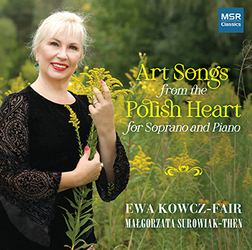
ART SONGS FROM THE POLISH HEART
for Soprano and PianoMieczysław Karłowicz, Antoni Szałowski, Karol Szymanowski, Adam Wieniawski
EWA KOWCZ-FAIR, soprano
MAŁGORZATA SUROWIAK-THEN, piano
[MS1835]
$14.95
REVIEWS
"Both Ewa Kowcz-Fair and Małgorzata Surowiak-Then are fervent and convincing advocates for this repertoire. Kowcz-Fair sings with the utmost feeling and rich, secure tone. Surowiak-Then’s vibrant and sensitive renditions of the colorful piano writing offer great pleasure. The recording, made at the ZPSM Concert Hall in Bielsko-Biała, Poland, is excellent... These are fine renditions of repertoire that deserves greater exposure. Recommended."
Ken Meltzer, Fanfare [May/June 2024]
"the songs are nicely sung by soprano Ewa Kowcz-Fair and accompanied in idiomatic and suitably subdued fashion by pianist Małgorzata Surowiak-Then."
Mark J. Estren, InfoDad [2023]
"In the settings of folk songs such as these, and four more by the hands of other composers, a rich trove of 24 in all, the deep persuasive charm of the lyrics finds perfect expression in the smoothness and beauty of Ewa Kowcz-Fair’s voice, which never goes over the top into an operatic style but is ideally suited to the deep, and frequently understated, emotion in the folk songs themselves."
Phil Muse, Atlanta Audio Club [2023]
PROGRAM NOTES
Art Songs from the Polish Heart is a collaboration of Ewa Kowcz-Fair’s passion, knowledge, and many years of experience in performing Polish folk music. She has a commitment to further making known the works of famous and lesser known Polish composers who were inspired by the country’s folk melodies.Few artists include these songs in their repertoire. Ewa Kowcz-Fair presents them to show their importance in Polish culture. Her beautiful dramatic soprano voice offers the listener a musical palette of broad colors. The Fazioli piano, especially chosen by her accompanist, Małgorzata Surowiak-Then, complements Kowcz-Fair’s lush singing.
Polish folk songs reflect the routines of everyday life. The songs are of love, longing, dance, work, war, and the beauty of the Polish countryside. Often the music brings the listener to imagining scenes of horses sauntering, trotting, galloping and neighing, all offering a day in the country. In complete contrast, they can tell of seduction, infidelity, despair, murder.
Thrilling audiences with her dramatic soprano, Ewa Kowcz-Fair is equally at home in oratorio singing, intimate recital programs and opera. Well known as an interpreter of Polish folk song and tradition, she regularly appears as a soloist with The Lira Ensemble of Chicago. She is a specialist in performing Polish folk songs in classical settings since her teens; as this type of music was surrounding her. Critically hailed for her singing in the Lyric Consort›s release of Pergolesi’s Stabat Mater conducted by Marek Rachelski, she continues to champion modern as well as established vocal repertoire. She is the winner of the Marcella Sembrich-Kochańska Vocal Competition in Savannah, Georgia. Past roles include Dido in Purcell’s Dido and Aeneas, Donna Elvira in Mozart’s Don Giovanni, Contessa in his Le Nozze di Figaro, Vitellia in La Clemenza di Tito and Mimì in Puccini’s La bohème. A specialist in oratorio, Kowcz-Fair has sang highly lauded soprano roles in Dvorák’s Stabat Mater, Mozart’s Requiem and Rossini’s Stabat Mater. She made her Orchestra Hall Chicago debut singing Hanna in Moniuszko’s opera Straszny Dwór and was invited to sing Halka in Moniuszko’s opera Halka. Kowcz-Fair is a graduate of the Kraków Music Conservatory, studying with Barbara Walczyńska.
Małgorzata Surowiak-Then graduated from the Kraków Music Conservatory in the class of Ewa Bukojemska. She collaborates with many instrumentalists and vocalists and is active playing at festivals and competitions. She has won awards for best piano accompaniment at the national and international level. Małgorzata Surowiak-Then has released a recording of chamber music by Grażyna Bacewicz. She has collaborated for many years with the Trio Amadeus Ensemble, and is also a successful piano teacher at the National Music School at Bielsko-Biała.”
PROGRAM
KAROL SZYMANOWSKI (1882-1937)TWELVE KURPIAN SONGS / PIEŚNI KURPIOWSKIE, OP.58 (1930-33)
I. The Cranes Were Flying / Lecioły zurazie
II. The Rainstorm Has Come / Wysła burzycka
III. Beware, Mother / Uwoz, mamo
IV. At the Lake / U jeziorecka
V. Grey Horses by the Forest / A pod borem siwe kunie
VI. Whip the Horse / Bzicem kunia
VII. The Felled Oak / Sciani dumbek
VIII. Fly, My Voice, Over the Dew / Leć, głosie, po rosie
IX. Neigh, Horse / Zarzyjze kuniu
X. The Night is Dark / Ciamna nocka, ciamna
XI. Fish Were Migrating / Wysły rybki, wysły
XII. Everyone Has Arrived / Wsyscy przyjechali
ADAM WIENIAWSKI (1879-1950)
EIGHT POLISH FOLK SONGS / POLSKIE PIEŚNI LUDOWE (1926)
Journal I / Zeszyt I
I. The Teal Duck Swims / Płynie cyraneczka
II. A Bit of News Happened / Stała się nam nowina
III. I Am Riding Down the Road / Ja jadę drogą
IV. Who is Sad / A kto smutny
Journal II / Zeszyt II
V. In Front of the Manor / Przede dworem
VI. My Johnny Told Me / Mówił mi Jasieńko
VII. Oh Da Dyna, Da Dyna / Oj da dyna, da dyna
VIII. A Girl Herded Cattle / A gnała dziewula
ANTONI SZAŁOWSKI (1907-1973)
THREE FOLK SONGS / TRZY PIEŚNI LUDOWE (1950)
I. Hey Now, You Forest Violet / Hejze ino fijołecku leśny
II. Mother of Mine / Matulu moja
III. Not Far from the Lake / Niedaleko jeziora
MIECZYSŁAW KARŁOWICZ (1876-1909)
By the Oak Tree / Pod Jaworem (1898)
MSR Classics
